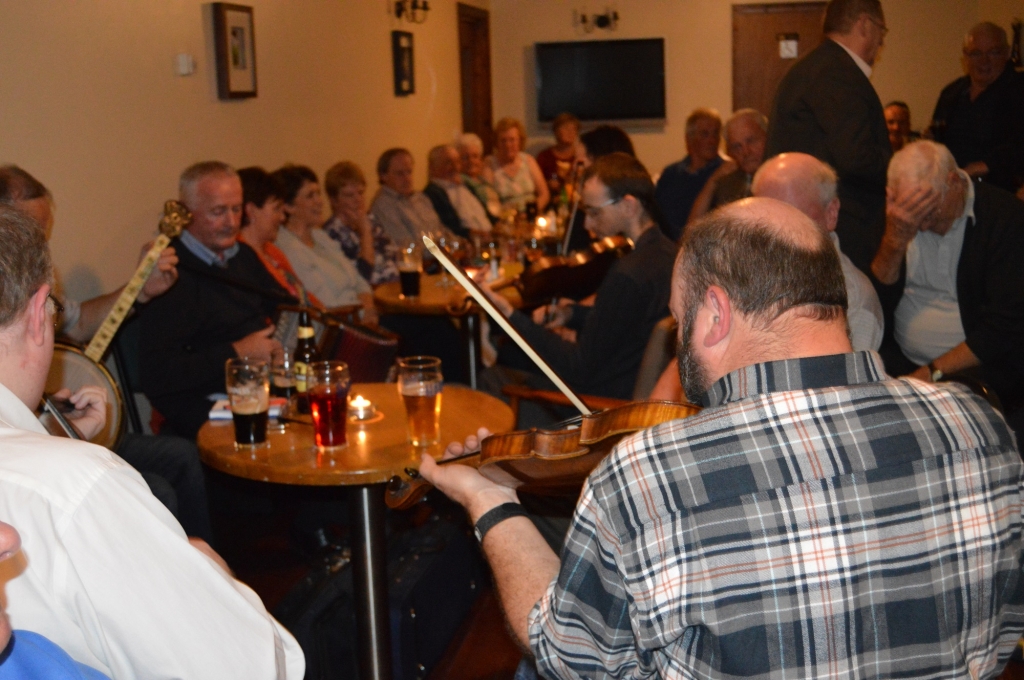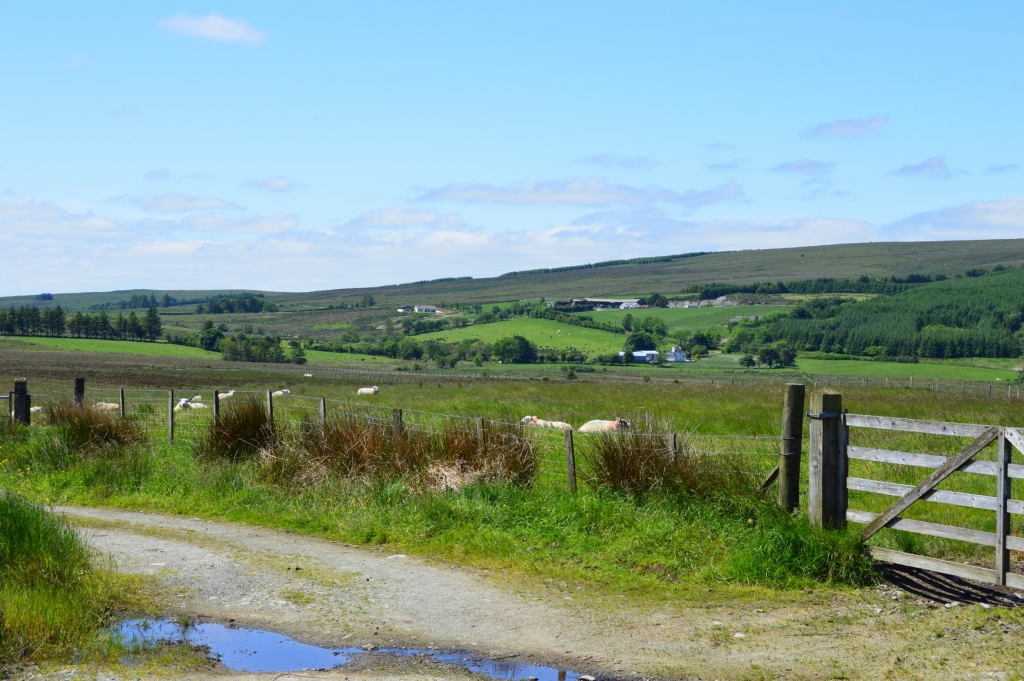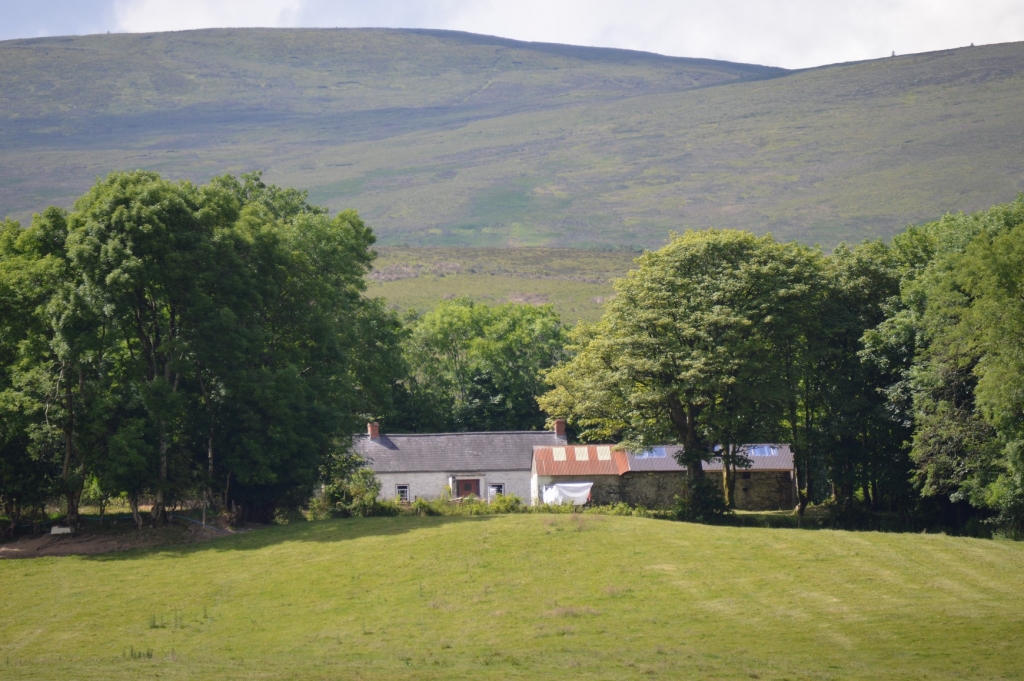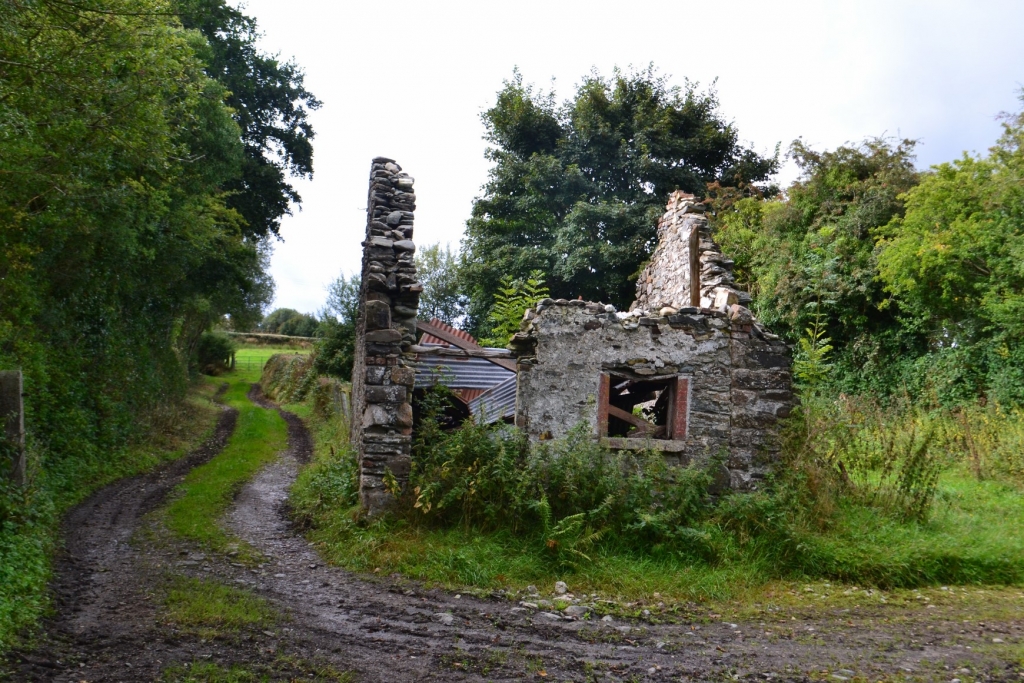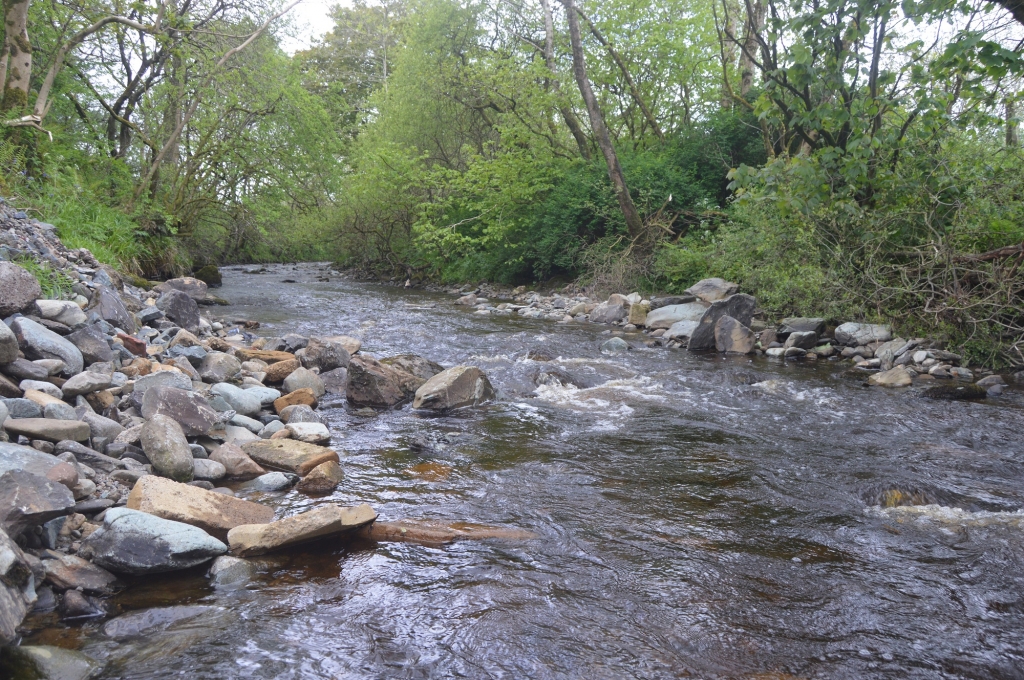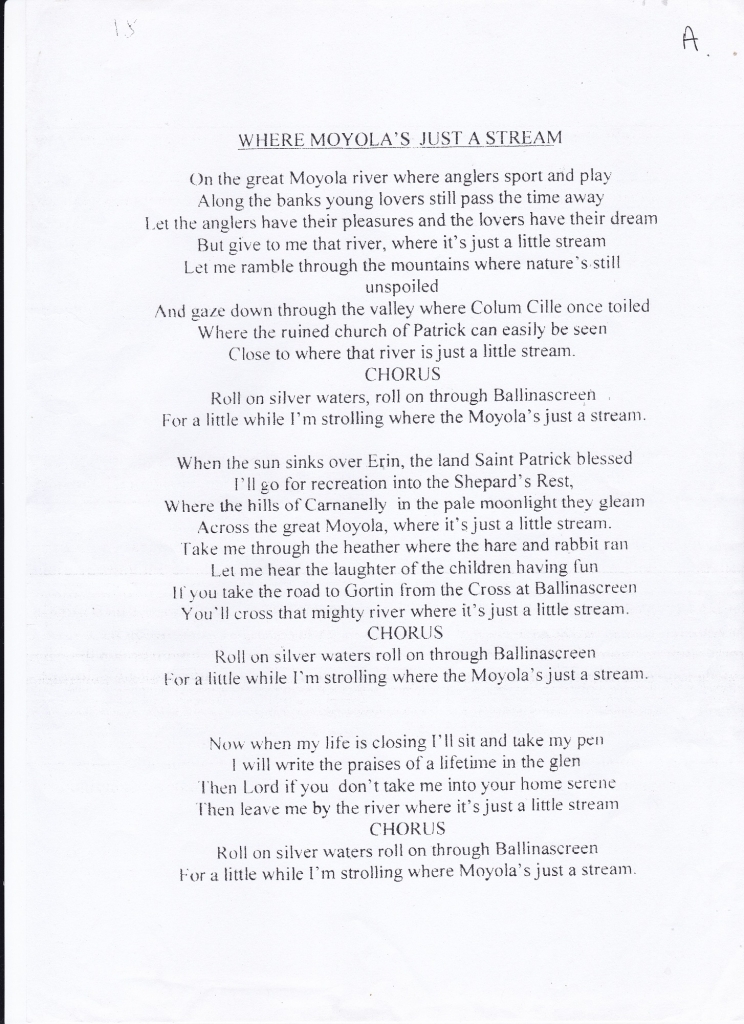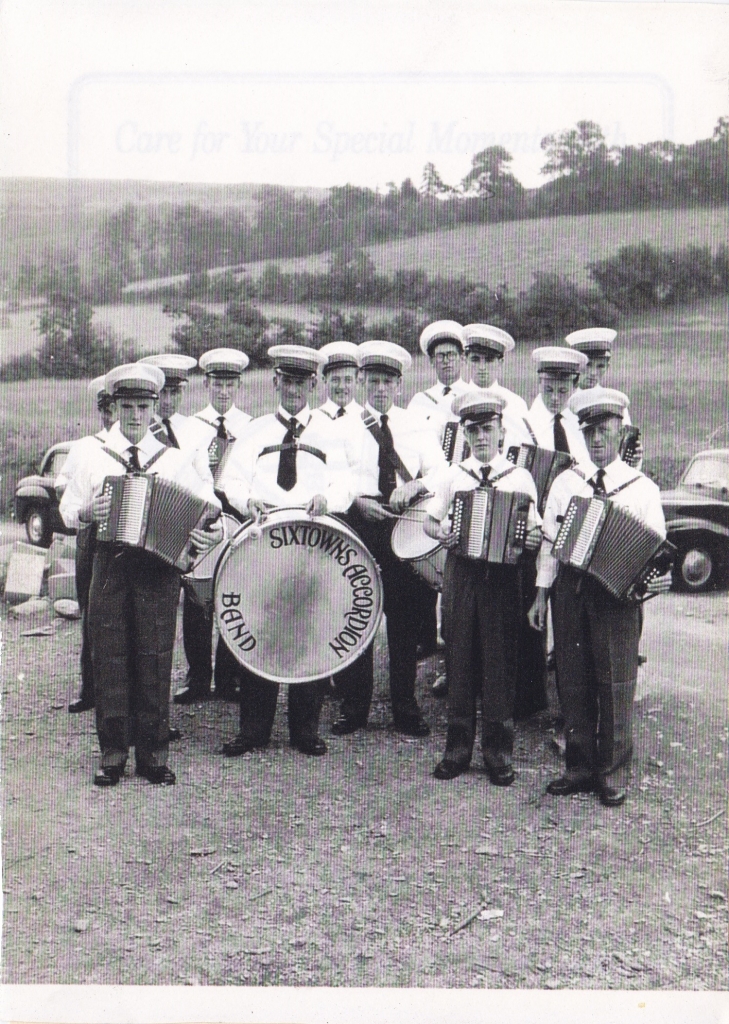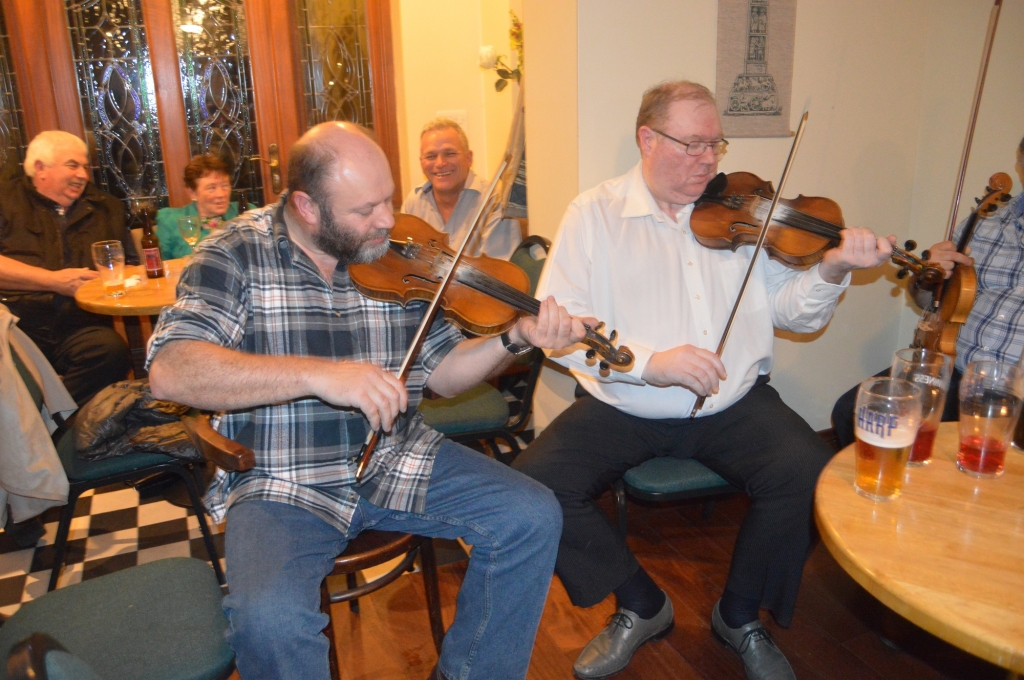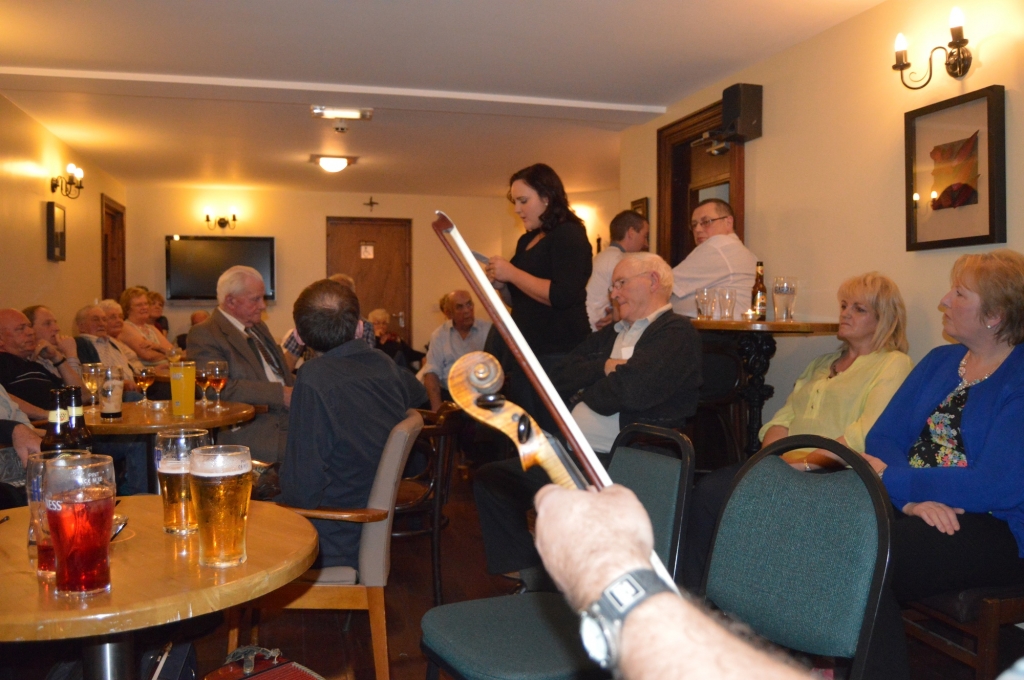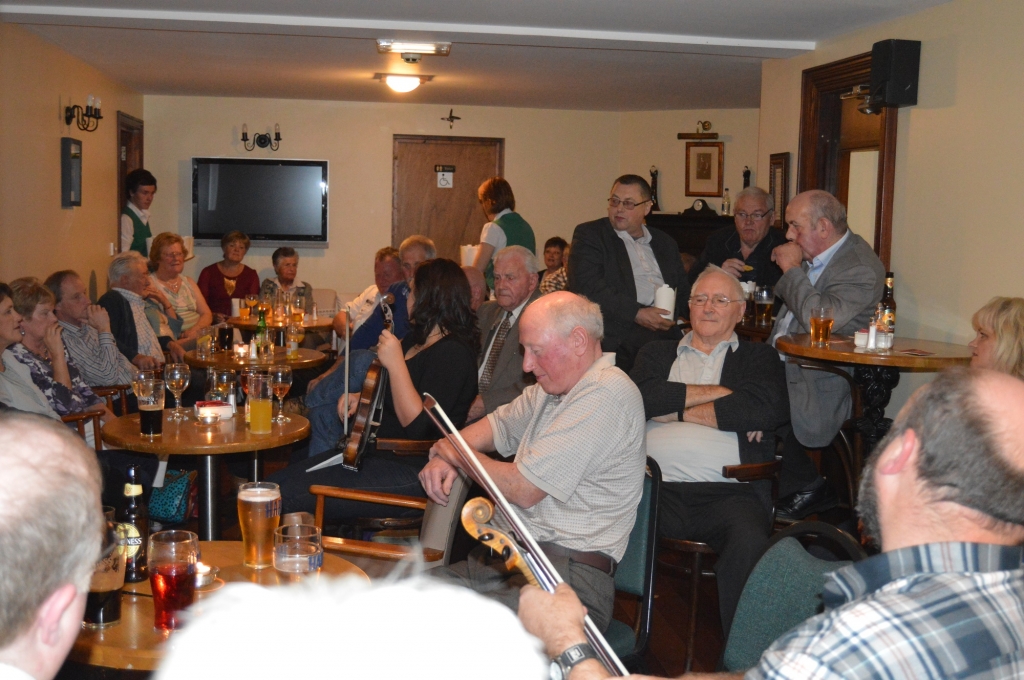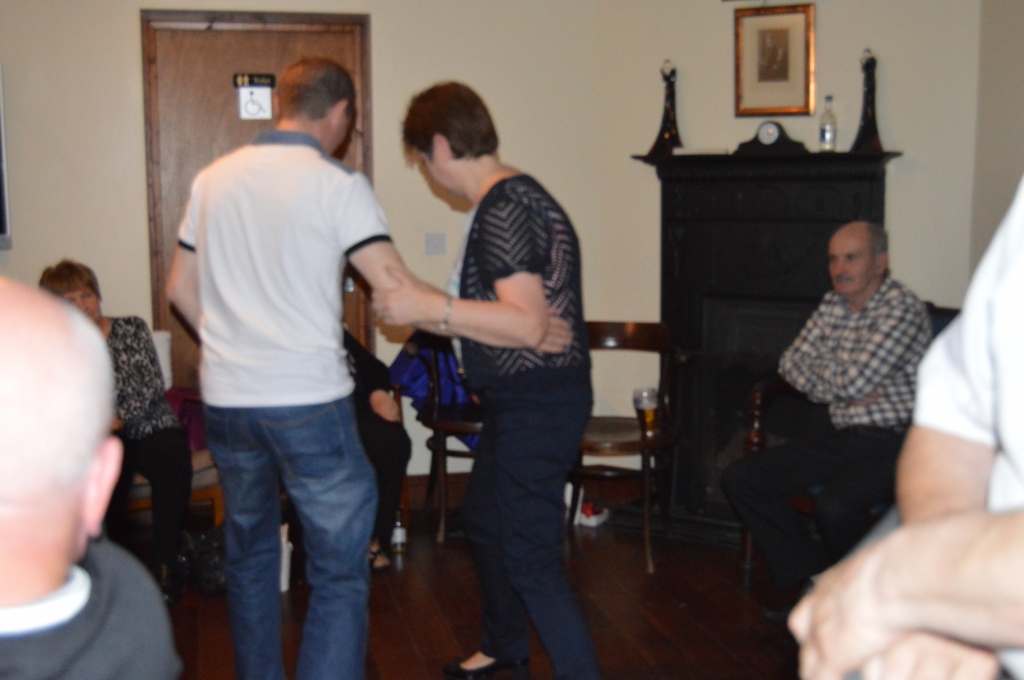Music, poets and culture.
When John O`Donovan visited Ballinascreen in 1834 this is what he remarked about the language and culture of the people of that parish;
There are few parishes that have retained its ancient Irish character for so long. Up to 20 years ago the old wooden mether or drinking vessel was in common use. The old songs are still sung and the Irish language universally spoken.
It is sad indeed to think that before the end of that century, a period of just over 60 years, all this would have virtually disappeared into history. Although there were still some people around the start of the 20th century who had some Irish, all the old songs, poems and stories of that rich tradition were gone from the area. The language went into serious decline in the second half of the 1800`s, with emigration and the increasing influence of the English language and with it went the old Gaelic traditions. Perhaps the greatest reason for the speedy disappearance of these traditions was that it was an oral culture and since there were no tape recorders or movie cameras in those days, they died out with the holders.
However, the strong Celtic cultural inclinations still remained and the Sixtowns has had its share of contemporary bards and artists throughout the 20th century. The best known poet of the area during this period was undoubtedly Wee Geordie Barnett, who during his very lifetime in the Sixtowns wrote poems and songs about all aspects of life in the place as well as its people. Geordie wrote poems about farm life, like “Mellon`s Potato Gathering” which touches on just about everything to do with a day`s potato digging in the 1950`s. He wrote about place, like “The Little Schoolhouse Lane”, “Owenreagh” and “The Sixtowns”. In these poems we can sense his intimate affection and pride in the place where he was born and brought up. No man in the parish took more notice of so many aspects of his environment than Geordie did for he was a self made historian, archaeologist, botanist, geologist, folklorist, musician, poet and local character. All these talents came out in his poems.
He wrote songs and penned poems about local events which took place in the locality like “The Sixtowns Football Game” or “The Sixtowns Band” or” The Sixtowns Concert”, each one recording and celebrating history in the area.
He also wrote about happenings and feats which took place in the Sixtowns like “The Tullybrick Accident” about an accident involving a tractor while ploughing in Tullybrick. It was not a serious accident but still rose some stir in the neighbourhood. Geordie liked to write about all things big or small and this is why his works have made such a precious contribution to our local heritage.
Geordie, writing in one of his poems, about the state his house was getting into, says;
But I`m not inclined to worry, as its built of stone and lime,
and if Hitler doesn`t level it, it might do me my time.
I haven`t got a woman and I wouldn`t let one in,
As I`m fit to do my cooking in my wee black tin.
In just four lines he expresses his laid back attitude to his house, his light hearted concern for how the war was going at the time, his opinions about women and marriage and finally his independence and ability to live alone happily. This is typical of many of Geordie`s poems and songs.
Another man who dabbled a bit at writing poems about life in the Sixtowns was Barney McEldowney who settled in Moyard and was married to a woman called Anne Connolly by her maiden name. He would make up limericks about amusing things which took place in the locality. For example, he made one called the “Sixtowns Cow”, about a mythical cow which went on the rampage in the upper end of the Sixtowns. She was eventually arrested and taken to court before being sentenced to a spell in Derry jail. Johnnie Bradley from Moyard gave us the words of this amusing song.
“Glenviggan, at the top of Ballinascreen….”
The Sixtowns Cow.
Well you have heard about the famous cow that they had down at the lough,
And how she ate the plenishing around Killelagh,
But she would n`t make a suckin` calf to one that I have seen.
She was reared up in Glenviggan at the top of Ballinascreen.
The first raid that she made was at Barney Mary Brian`s
She ate a quilted blanket that was out upon the line.
She next went over to Tammy`s
And I hear the people say,
She tumbled a stack of corn and she ate a pake of hay.
It must have been the devil that put it in her head
For she was next to pay a visit to a man called Eddie Ned.
She ate a plough and harrow there
And a thing they call the mow
And swore that she would eat the handles afore that she would go.
She went down through a townland which the people call Moyard
But found the gates all tightly shut
And the doors securely barred.
One woman claimed the cow could blink
And Jane declared she`d spey,
For she roared at Mickey Connolly before his wedding day.
Aye, you may say there was commotion when she came down to Mick (Doyle)
For she ordered out a case of stout
And wanted it on tick.
The sergeant he was sent for
And when he did come round
She soon was haltered securely
and marched to Draperstown.
And on the day of the trial
I honestly do declare,
you`d have thought it was a rising
or indeed a Lammas fair.
They were in from Moneyneena
And up from Ballynure
the oaths that they swore against her
Would have hanged her, that`s for sure.
And on the way to Derry jail
She then began to pray,
That all the milk in Ballinascreen
might turn to curds and whey,
that their cows might all be strippers
and their calves might all be bulls
and not an inch of horns would grow
out of any of their skulls.
She was about a month in Derry
When Loughran came around. (local postman)
He had a letter in the bag addressed to the Sixtowns.
She said she was in clover
And her belly always full
And before that she would be content
She thought she would take the
Johnnie also remembered another old poem written by a well known local poet. Johnnie (Paul) Kelly wrote a kind of amusing poem pertaining to the Moneyconey about a bunch of lads from Bancran who gate crashed a house party in Moneyconey which was being held by a family of young women by the name of Bradley. It is not of any great significance poetically, but the incident which he wrote about would have been typical of what went on in most rural areas around the Sperrins at the time. If the word got out on a particular night that a party was being held in a house where there would be a few girls in attendance, then any young eligible bachelor would be game to go, whether he was invited or not. Sometimes they were made welcome anyway but in this case, the “chancey boys“ from Bancran were not.
The party in Roddy`s.
As Christmas joys were passing in the year of `25,
Seven strapping sons from Bancran, happy and alive,
Filled their bottles by the starlight,
Of Whitehorse filled the best
And in their search for pastime,
Turned their faces to the west.
Joyful was the festive season as they wandered up the stream,
`til they found a country cottage
that they believed was in their dreams.
Just a common country cottage
But the outside door was barred,
But when friendship chanced to gain admission
It turned her greeting guard.
Father bid them scant welcome
To sit up beside the fire
And he seized a broken lamp that was for lighting round the byre.
The maidens five in number,
Had three swell lads in before
And to keep the roughs from coming they had barred the parlour door.
But the lynx eye of these young men,
They soon referred their case
And they told oul` James what was coming
All about his dwelling place.
Now it wasn`t like a graveyard
that would hold the rich and poor
But something more like a bungalow
where the rich might feel secure.
They fried some fadge for Kelly
For to keep him fit and sound
As Pat Kielt played the piano
With the potstick, up and down.
The maidens scorched them sorely
And Ellen was the last,
Saying men you`d better keep on trampin`
For I`ve got manners from Belfast.
To someone today reading this poem, a lot of the content might seem nonsensical but in those days “sconcing” and innuendo were used as a form of entertainment and in many cases the more cryptic you could be with your jibes then the more effective you were. In those days the people had to make their own entertainment and they took great enjoyment in jibing each other and often they might only have to hint at something that pertained to that person for the company to just catch on what was meant. The more sly the dig, the more amusement it drew from the company. This poem would fall into that category and that seems to be what inspired the author.
Nicholas and the Bull.
Long ago in the parish of Ballinascreen, it is said that there were two rival families of poets who were always in contention with each other and they were the Cassidys and the McWilliams. This tradition eventually died out and the poets were no more. However, talent always continue somewhere in the genes and one wonders if a certain Nicholas Cassidy had any conection with one of these esteemed families of poets. Nicholas, who lived in Cavanreagh, was walking to Sunday mass one winter`s morning. Now there had been a bullock belonging to a neighbour, which had been giving him serious grief over a period of time by breaking into his cabbage patch and filling its stomach with the best of fresh kale. Nicholas tried everything to stop the bullock`s rampages but to avail. So on that Sunday morning, after walking a short distance, he came upon the bullock lying dead as a doornail on the roadside. With a huge sense of relief and very little sympathy for the dead animal, he penned this short verse in the snow with his stick in the fresh snow;
Here lies the remains of Cleary`s bull
On Saturday night he made his will.
On Sunday morning he stretched his tail,
After a feed of Nicholas`s kale.
Here he lies without quilt or blanked,
Stiff as a poker and the lord be thanked.
Nicholas made a very poetic point to the owner of the beast, without rising any rows and he got maximum publicity with the passing that way of the many Sunday mass goers. If a person can write poetry like this at the drop of a hat, then there must have been a talent that was never developed in this man`s case. Lack of educational opportunities of the time may have hindered the development of this man`s undoubted talent.
The last person to have penned a song about the Sixtowns was another man of undoubted natural ability who never got the chance to develop his talents, the late Gerard (Tammy) Conway from Glenviggan. Gerard worked for most of his life as a shepherd and during his lifetime working in the open countryside around the Sixtowns, developed an intense love for the area and this is borne out in the words of a beautiful song which he wrote about the Moyola river and its source high up in the Sixtowns glen.
THE GREAT MOYOLA RIVER.
There were always people in the Sixtowns, down the centuries who could sing the ancient songs or play musical instruments, because we already know that the ancient culture survived here for longer than it did in most other places. However instruments were never in good supply until later times. In those days young musicians learned to play under the guidance of older musicians, so we can assume that there were always musicians in the Sixtowns. Perhaps the most renown musician of the last century who lived in the in the Sixtowns, was Daniel “the fiddler” McBride who was a brother of Master McBride who lived at the present McNally`s house in Altaeskey.
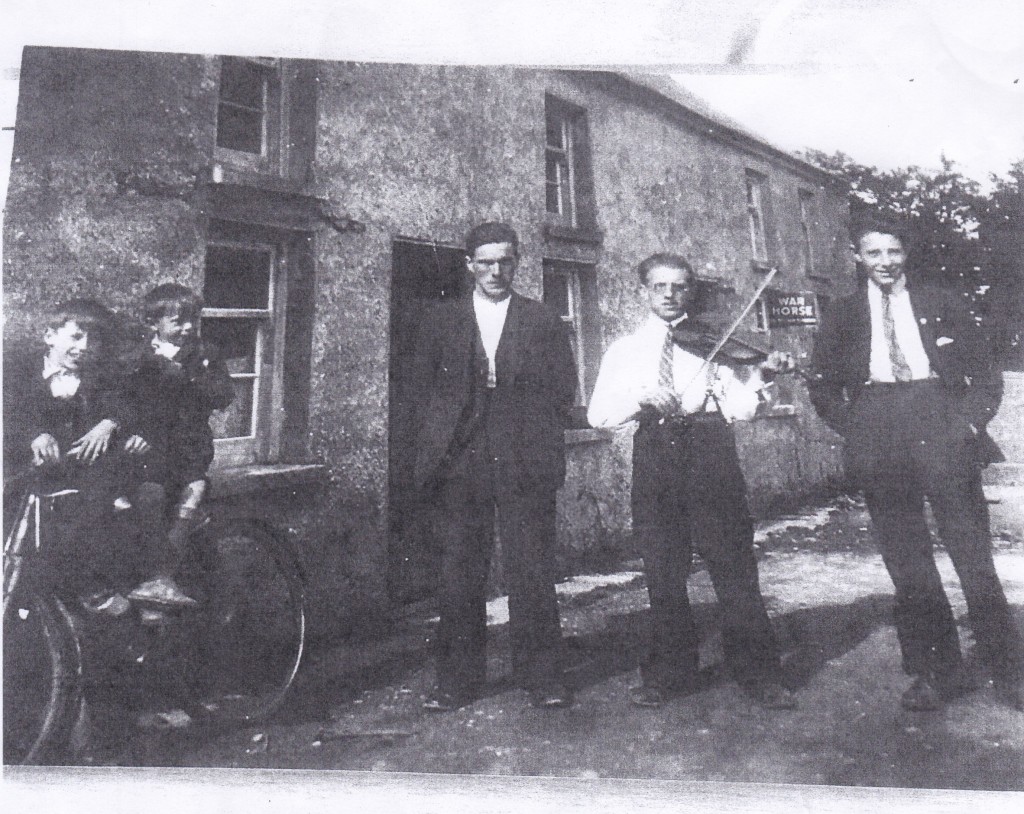 PHOTO OF DANIEL
PHOTO OF DANIEL
Daniel McBride is pictured in the centre of the ot the photo.
Daniel himself lived for some time at Anne Campbell`s shop near the Sixtowns chapel. He was reputed to have been a fine fiddle player and was in constant demand. He undoubtedly taught a few of the young locals to play for we had people like Johnnie (Sophia) Gillespie and Frank (Barney) Conway who were decent players in the era after Daniel passed on. In those days there were really very few dances and other than house parties for people who were emigrating, or end of the year barn dances. McBride`s store in Altayeskey was venue for such nights and one or two musicians would be enough to provide the music for the dances. They danced highlands and quick steps and most people were proficient in these dances.
St. Patrick`s chapel always had a choir of some standard down through the years . John Kelly senior from Crockmoran played the concertina for the choir for a time in the choir. Later, local teacher, Mrs Peg McNally resumed that role on the organ. Johnnie Bradley, Frank Barney and Paddy Flanagan played in a small dance band which did dances as far away as Gortin and Glenelly. The older people would talk of fine singers in the area down the years like, the John Franks (Bradley of Moyard), Mickey (Sother) Gillespie, Pat Kielt, Eddie Ned Kelly, the Bradleys (John Franks) of Moyard and many others. In more recent times, one singer who had more songs than anyone else and had a fine traditional style of singing them was Mary O`Hagan from Glenviggan who also played the accordion. Her son, Seamus, was also a fine singer and gave the best rendering of “ The Irish Rover” to be heard anywhere. Paddy (Daniel) McBride) was reputed to be a `tastey` player of the accordion.
In 1957 St. Patrick`s chapel celebrated its centenary year and it was decided that a band would be formed to help mark the occasion. Fundraising began and the cost of outfitting the entire band was raised in a very short time. Bernadette McAlllister, from Cahore, was brought up to teach the band to play and march. The long summer evenings of that summer were spent practising in the school or marching up and down the road. The local people came out in force to see this novel activity and they sat on the hedges watching the bandsmen .The Sixtowns glen rang out with the sound of The Three Flowers, The Moon behind the Hill, The Dawning of the Day, The Mountains of Pomeroy and many other sweet marches, evening after evening.The band played at a Lagan Cup match between Derry and Armagh in Straw as well as other sports days in the locality.
Those in the band included;
John McKenna, John McNamee (Hughie), Brian Quinn, Johnnie Bradley, Art McNally, Frank McNally, Barney Glasgow, Paddy (Tammy) Conway
Frank Barney and Joe McRory shared the role of big drummer while Paddy and Jim Glasgow, and Peter Flanagan played the wee drums.
Regretfully, the band broke up after the centenary celebrations were over and the instruments were sold. It was probably the most ambitious community venture undertaken by the people of the Sixtowns for a very long time.
Nowadays with musical instruments much more affordable and lots of opportunities to learn to play music, we now have quite a few singers and instrumentalists in the Sixtowns. We hold cultural nights at regular intervals now providing locals with an outlet for their talents with musical instruments, song, dance and story telling and poetry.

